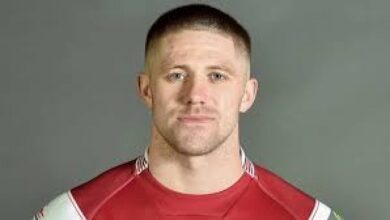Iain Dowie: From Aerospace Engineer to Premier League Manager — The Inspiring Journey of a Northern Irish Football Legend

Early Life and Background
Iain Dowie’s life story is one of remarkable transformation — from the world of aerospace engineering to the high-pressure environment of professional football management. Born on 9 January 1965 in Hatfield, Hertfordshire, England, Dowie’s journey to football stardom was anything but conventional. Though English by birth, he proudly represented Northern Ireland on the international stage, showcasing his dedication and passion for the sport.
Before entering the football world, Dowie was academically gifted. He earned a Master’s degree in Engineering from the University of Hertfordshire, later working as an aerospace engineer for British Aerospace. It was during this time that his love for football began to take shape, as he balanced his professional career with weekend football in the lower leagues. His discipline, intelligence, and analytical mind would later become hallmarks of his approach to football management.
The Early Footballing Years
Non-League Beginnings
Dowie’s football career began humbly in non-league football, where he played for Cheshunt, St Albans City, and Hendon. Despite being a late bloomer, his talent, physical presence, and striking ability quickly caught attention. At a time when many players had already turned professional, Dowie’s late emergence proved that determination and persistence could defy traditional pathways to success.
Professional Breakthrough at Luton Town
His first major opportunity came when Luton Town signed him in 1988. As a forward, Dowie demonstrated both aerial power and tenacity, scoring vital goals and establishing himself as a reliable presence in front of goal. His work ethic and intelligence on the pitch reflected his engineering background — methodical, precise, and calculated.
His performances at Luton led to moves to other top English clubs, setting the stage for an impressive playing career.
The Premier League Era
West Ham United and Southampton Stints
Dowie’s spell at West Ham United showcased his commitment and leadership. Fans admired his work rate and ability to influence matches even when not scoring. Later, at Southampton, he became known for his professionalism and willingness to give his all for the team.
Although never considered among the most technically gifted strikers, Dowie compensated with hard work, tactical understanding, and a never-say-die attitude. These qualities earned him a reputation as a dependable and respected player in English football.
Crystal Palace and Queens Park Rangers
His time at Crystal Palace and Queens Park Rangers (QPR) further solidified his standing in the game. For Palace, he became a cult hero, admired for his effort and determination. Across his playing career, Dowie made 497 club appearances and scored 128 goals, an impressive tally for a player who entered the professional ranks relatively late.
International Career with Northern Ireland
Representing Northern Ireland, Iain Dowie earned 59 international caps and scored 12 goals between 1990 and 1999. His passion for the green shirt was undeniable, and his performances reflected the grit and pride associated with Northern Irish football. Despite competing in a challenging era, Dowie’s commitment to his national side was unwavering, and he became an inspirational figure for younger players across the nation.
Transition to Management
After hanging up his boots, Dowie naturally gravitated towards coaching and management. His analytical mindset, leadership qualities, and engineering-like problem-solving skills made him a strong candidate for the technical side of the game.
Oldham Athletic: The Start of a New Chapter
Dowie began his managerial career with Oldham Athletic in 2002, leading them through one of their most competitive seasons in the early 2000s. Under his guidance, the club showed improvement in fitness, motivation, and tactical discipline. This early success earned him recognition as a rising managerial talent in English football.
Crystal Palace: A Remarkable Turnaround
Perhaps the most defining chapter of his managerial career came at Crystal Palace. When he took over in December 2003, the club was struggling near the bottom of the Championship. Against all odds, Dowie inspired a remarkable turnaround. Through sheer motivation and smart tactical adjustments, he led Palace to promotion via the play-offs at the end of the 2003–04 season.
That achievement made him a household name among fans and pundits, with many admiring his ability to instil belief in his players. His work at Palace remains one of the most dramatic promotion stories in modern football.
Managerial Challenges and Later Roles
Charlton Athletic and Coventry City
After leaving Crystal Palace in 2006, Dowie took charge of Charlton Athletic. However, his time there was short-lived, lasting only a few months due to a string of unfavourable results. Despite this setback, he remained respected for his professionalism and approachability.
In 2007, Dowie became manager of Coventry City, where he again focused on discipline and rebuilding team spirit. Though results were mixed, he laid the groundwork for improved structure and team culture — values that continued to define his coaching philosophy.
Return to Queens Park Rangers and Hull City
Dowie also had brief managerial stints at Queens Park Rangers and Hull City. At Hull, he was appointed in 2010 during a relegation battle in the Premier League. While unable to prevent the club from dropping down, his experience and tactical insight were widely acknowledged.
Beyond the Touchline: Media, Punditry, and Personal Life
Following his managerial career, Iain Dowie became a respected football pundit and commentator, appearing on major sports networks. His articulate analysis and ability to break down complex football tactics into clear explanations have made him a popular voice in the media.
Dowie’s background as an engineer gives him a unique perspective — his understanding of data, systems, and efficiency adds depth to his football commentary, often highlighting the fine balance between physical performance and strategic planning.
Health Scare and Resilience
In 2024, Iain Dowie suffered a cardiac arrest during a spin class. Thanks to the quick response of emergency staff and medical professionals, he survived the incident and later underwent surgery to have an implantable cardioverter defibrillator (ICD) fitted. Dowie described the experience as life-changing, expressing immense gratitude for being alive and emphasising the importance of health awareness.
His recovery once again revealed the resilience that has defined his entire career — a man who refuses to be defeated by circumstance, whether on or off the pitch.
Legacy and Influence
Iain Dowie’s legacy in football extends far beyond goals and tactics. He represents the idea that intelligence, hard work, and perseverance can overcome any obstacle. Few players transition from aerospace engineer to Premier League manager, and fewer still do so with such integrity and humility.
He has influenced countless players and aspiring coaches, proving that football success is not limited to those who begin their journey early. Dowie’s story is one of reinvention — from an academic to an athlete, and from a player to a leader.
The Meaning of True Determination
Throughout his career, Iain Dowie has embodied determination. His story reminds fans and professionals alike that success is not merely a product of talent but of relentless effort, adaptability, and belief. Whether leading teams to unexpected victories or overcoming personal health challenges, Dowie continues to inspire those who follow his journey.
Conclusion
Iain Dowie’s life stands as a testament to perseverance, intelligence, and passion. From designing aircraft components to managing football clubs, his journey defies convention and celebrates the power of dedication. As a player, manager, and now commentator, Dowie has left an indelible mark on the sport he loves.
His story encourages future generations to dream big, stay resilient, and always believe that with hard work — even the most unconventional paths can lead to greatness.



